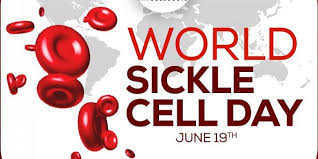Today we join the rest of the world in celebrating World sickle cell day Sickle cell anemia is a genetic condition that people are born with, meaning there’s no way to “catch” it from someone else. Still, you don’t need to have Sickle cell Anemia in order for your child to have it, please endeavor to go for testing with your partner before having children. KNOW YOUR GENOTYPE
AA + AA = AA, AA, AA, AA (Excellent)
AA + AS = AA, AS, AA, AS, (Good)
AA + SS = AS, AS, AS, AS, (Fair)
AA + AC = AA, AA, AA, AC. (Good)
AS + AS = AA, AS, AS, SS, (Very Bad)
AS + SS = AS, SS, SS, SS, (Very Bad)
AS + AC = AA, AC, AS,SS. (Bad; Advice needed)
SS + SS = SS, SS, SS, SS, (Very Bad)
AC + SS = AS, AS, SS, SS, (Very Bad)
AC + AC = AA, AC, AC, SS. ( Bad; Advice needed)
Our thoughts and prayers are with people living with sickle cell anemia. Affected children experience a lot of physical as well as emotional trauma. Being there for someone is always a good thing. But it’s even more important when someone is dealing with an illness like sickle cell. Missing a lot of school can mean falling behind on schoolwork and having to skip social activities, which can make a person feel isolated and alone.
Be around. If your friend is missing school, ask if you can visit. Hang out, listen to music, talk about what’s going on at school, or do homework together. If you can’t be there in person, find another way to talk.
Encourage healthy habits. Everyone should eat well and stay hydrated, but it’s especially important for someone with sickle cell disease. Help your friend avoid alcohol and smoking, both of which can make things worse. And if you don’t drink or smoke, your friend won’t feel “different” or worry about fitting in. Join your friend in making healthy choices for lunch and snacks.
Parents should ensure to go to all doctor’s visits and share any concerns or new symptoms, make sure your child takes all prescribed medicines, follow up with any recommended specialists to check for complications. Help your child avoid pain crisis triggers, such as extreme temperatures or stress. Talk to the doctor about which activities are OK for your child and which to avoid. Make it clear that your child should not smoke, drink alcohol, or use drugs because these can cause pain and other problems. Encourage your child to drink lots of liquids and get enough rest.

